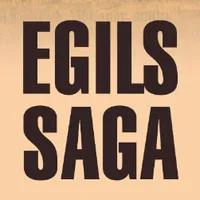Egill
Egill
Egill the first
Egill
Egill
Egil
Egil
Egil
Égil
Egil
Égil
Эгиль
Egil
Egil
Árið er níu hundruð og sjö.
das Jahr|||||
the year|||hundred||
rok|jest|dziewięć|sto|i|siedem
The year is nine hundred and seven.
Egill er þriggja ára strákur sem býr á Íslandi.
Egill||three years old||boy||||
Egill|jest|trzech|lat|chłopiec|który|mieszka|na|na Islandzie
Egill is a three-year-old boy who lives in Iceland.
Hann er með svart hár og er mjög ljótur.
||||||||ljótur
|||black|hair||||ugly
||||||||hässlich
on||ma|czarne|włosy|||bardzo|brzydki
He has black hair and is very ugly.
Pabbi hans heitir Grímur og er sköllóttur, þess vegna er hann kallaður Skalla-Grímur.
||||||sköllóttur||||||Skalla|
Dad|||Grímur|||bald|that|therefore|||called|Bald|Grímur
||||||glatzköpfig|||||genannt||
tata|jego|nazywa się|Grímur|i|jest|łysy|tego|dlatego|jest|on|nazywany|Skalla|Grímur
His father's name is Grímur and he is bald, that is why he is called Skalla-Grímur.
Þrátt fyrir að vera bara þriggja ára er Egill mjög sterkur og mjög gott skáld.
||||||||||||||skáld
trotz||||||||||||||Dichter
despite|||be||three|||Egill||strong||||poet
pomimo|pomimo|być|być|tylko|trzech|lat||Egill|bardzo|silny||||
Despite being only three years old, Egill is very strong and a very good poet.
Hann er erfitt barn og er vondur við aðra krakka.
||ein schwieriges|||ist|böse|||
|||child|||mean||other|kids
He is a difficult child and is mean to other kids.
Í kvöld er veisla heima hjá afa hans Egils.
|||veisla|||||Egils
an|Abend||Feier||bei|Opa||
|tonight||party||at|grandfather||of Egil
Tonight there is a party at Egil's grandfather's house.
Fjölskyldan hans Egils ætlar í veisluna.
Fjölskyldan|||||veisluna
his family||Egill|is going||the party
Egil's family is going to the party.
„Má ég koma með?“ spyr Egill pabba sinn.
||kommen|||||
may||come||asks|Egill|dad|
"Can I come along?" Egill asks his dad.
„Nei, þú mátt ekki koma með.
||may||come|
"No, you can't come along."
Þetta er risastór veisla og allir þarna verða fullir.
||risastór||||||
||riesengroß|||alle|||
||huge|feast||everyone|there||drunk
It's a huge party and everyone there will be drunk.
Þú ert alveg nógu erfiður þegar þú ert ekki fullur.“ svarar Skalla-Grímur.
||||erfiður|||||fullur|||
du||||schwierig||||||||
|are|quite|sufficiently|difficult|when|you|are|not|sober|Skalla-Grímur replies||
„Du bist ganz schön schwerfällig, wenn du nicht betrunken bist.“ antwortet Skalla-Grímur.
You're quite difficult enough when you're not drunk." answers Skalla-Grímur.
Egill er ekki ánægður með þetta svar.
|||zufrieden|||
|||happy|||answer
Egill ist mit dieser Antwort nicht zufrieden.
Egill is not happy with this answer.
Þegar fjölskyldan hans er farin finnur Egill hest og fer á eftir þeim.
|||||findet||Pferd|||||
when||||gone|finds|Egill|horse||goes|||
||||weg||||||||
|||||||hest|||||
Als seine Familie gegangen ist, findet Egill ein Pferd und folgt ihnen.
When his family is gone, Egill finds a horse and goes after them.
Það er seint um kvöld þegar Egill mætir loksins í veisluna, þar situr fólk og drekkur bjór.
||||||Egill|kommt|endlich|||da|||||
||late|||||arrives|finally|||there|sits|people|||beer
|||||||verschijnt|||||||||
|||||||mætir|||veisluna||||||
It is late in the evening when Egill finally arrives at the party, where people are sitting and drinking beer.
Afi Egils sér hann.
grandfather|||
Egil's grandfather sees him.
„Egill!
Egill!
Af hverju kemurðu svona seint?
from|why|do you come||late
Why are you coming so late?
Viltu ekki koma og setjast hérna hjá mér?“
do you want||||sit|here|next to|me
Don't you want to come and sit here next to me?
„Jú takk“ svarar Egill og sest hjá afa sínum.
yes|||||sits||grandfather|
"Sure, thank you" Egill replies and sits down with his grandfather.
Pabbi hans og bróðir hans sitja á móti honum.
||||||am|gegenüber|
his father|||brother||are sitting||opposite|him
His dad and his brother are sitting across from him.
Veislan er stór og fólkið þar drekkur mikið.
veislan|||||||
the party||big||the people|there||
The party is big and the people there drink a lot.
Egill semur ljóð um afa sinn og les það fyrir fólkið.
|draagt voor|||||||||
|sefur|ljóð||||||||
Egill|singt|||||||||
Egill|writes|poem|about|grandfather|his||reads|it|for|the people
Egil writes a poem about his grandfather and reads it to the people.
Egil pisze wiersz o swoim dziadku i czyta go ludziom.
„Vá!“ segir afi.
Wow||grandfather
"Wow!" says grandpa.
„Þetta er alveg frábært ljóð.
|||great|
"This is a really great poem.
Takk, Egill minn.“
|my Egill|
Thank you, my Egill."
Næsta dag gefur hann Agli þrjár skeljar og andaregg fyrir ljóðið.
||||Ágústi||skeljar||andaregg||ljóðið
next||gives||to Agli|three|shells||egg of a duck|for|the poem
||||||schelpen||||
||||||Muscheln||Eier||
The next day he gives Agli three shells and a duck egg for the poem.
Następnego dnia daje Agliemu za wiersz trzy muszle i kacze jajo.
Egill er mjög ánægður með gjafirnar og semur ljóð um þær.
|||||gjafirnar|||||
|||happy|with|the gifts||composes|poem|about|
|||||||schreibt|||
Egill is very happy with the gifts and writes a poem about them.
Fólkið er mjög ánægt með ljóðin hans Egils.
|||||ljóðin||
|||satisfied||the poems||
|||||die Gedichte||
The people are very happy with Egil's poems.

